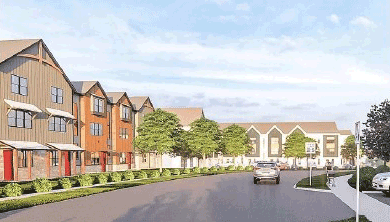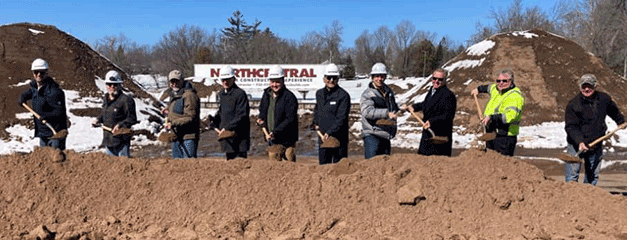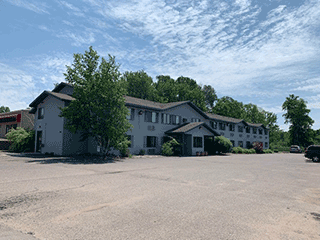
Proposed new building façade at Ladysmith Lindoo School Development.
Projects in Ladysmith, Elkhart Lake and Rhinelander highlight efforts to address workforce needs
MADISON, WI. FEB. 28, 2024 – Like many smaller Wisconsin communities, Ladysmith has struggled with finding and attracting workers due to a lack of affordable housing. But this small city in the Northwoods has found a solution a that was in plain sight for years — a now vacant elementary school.
Later this year, the former Ladysmith Elementary School will begin a new life, providing 40 rental units for workforce housing.
The Wisconsin Economic Development Corp (WEDC) has awarded the city a $200,000 Idle Site Redevelopment (ISR) grant, providing the final piece of a $13 million public-private sector partnership.

Illustration of new affordable housing units in Elkhart Lake
The Ladysmith grant is one of several workforce housing projects WEDC is assisting as local developers find new uses for old buildings. WEDC is also providing $228,000 for the city of Rhinelander to convert a former motel into a 31-unitapartment building, and $200,000 in for the city of Elkhart Lake to prepare an old county highway site for two developments that will create a total of 120 units of affordable and at-market rate rentals.
“What we’re hearing from communities around the state is that housing is a key element of meeting our workforce needs,” said Missy Hughes, secretary and CEO of the Wisconsin Economic Development Corporation (WEDC), the state’s leading economic development organization. “Smaller communities often face special challenges, such as putting together the needed financing. Public-private partnerships are often the solution, and WEDC is proud to provide these grants at a at a critical stage in the process so these projects can move forward.”
Ladysmith City Administrator Alan Christianson said the WEDC grant “is just going to be an absolute game changer. The funding is incredibly, incredibly important. Around here, $200,000 is really huge and it’s leveraging a total project of nearly $13 million.”
Christianson said the project addresses two major issues facing Ladysmith: a shortage of workers and a lack of affordable, quality housing for them. He said local employers can’t find workers to fill existing positions and are reluctant to consider expanding. Housing starts have been slow in this city of 3,500, with construction of a duplex and two or three homes considered a good year.
With one project, he said, “We’re gaining 40 housing units. “That’s huge!”

Groundbreaking ceremony for new housing project in Ladysmith
The fate of the old school had troubled Christianson and others for years. Built in 1958, the two-story structure was closed in 2017 and sold to the city for a dollar. Since then, it has stood empty on its 10-acre site, surrounded by homes a few blocks from downtown. But to raze the building was unthinkable.
“To build a concrete masonry structure like that today, whether for a school or workforce housing, the cost would be astronomical,” Christianson said.
As word spread of tentative plans, area employers sent the city letters of support – including Weather Shield, Rockwell Automation, Marshfield Clinic Health System, Dairy Farmers of America, and more. Once the conversion plans began to gel, Christianson heard from many residents that they liked the idea of going back to the old school and living there.
The converted school will have 33 units, a mix of one-, two-, and three-bedroom apartments, all affordable for renters earning less than the prevailing area median income. Seven townhomes will be built on the site and rented at the prevailing market rate.
The project also includes a community center, commercial kitchen, business incubator, meeting rooms, gym and ADA accessible playground for children of all ages and abilities. It’s estimated the entire project will mean 133 new jobs and $8.3 million in labor income.
Sean O’Brien, secretary of Northpointe, which is developing the project, said the city’s persistence in moving forward with the redevelopment “just shows how important this project is to the city and the community. More than just workforce housing, it checks so many boxes.”

Rodeway Inn converted into an apartment building with 31 units
A similar project is under way in Rhinelander, which received a $228,000 Community Development Investment (CDI) Grant to convert a former Rodeway Inn to an apartment building with 31 units that will provide affordable housing for seasonal workers during the busy tourist season and year-round. The project also includes space for new business.
“These apartments are critical,” said Patrick Reagan, Rhinelander city administrator. “We have a housing shortage just like everybody else, and to bring more housing into the market is great. It’s important that we have housing that meets the needs of everyone in the community, not just those with deep pockets.”
In Elkhart Lake, a $200,000 ISR grant will help the village prepare a site for two housing developments, one with 50 rental units, affordable housing for seasonal workers as well as veterans and people with disabilities; and the other with 70 townhomes, with no income restrictions. The ISR grant will help the village cover demolition and infrastructure costs.
“We’re a resort community with a lot of hospitality industries, so we’re hoping this will help a lot of those employees struggling to find places to live,” said Jessica Reilly, village administrator and clerk. “We don’t have a lot of apartments in the village. With these two apartment developments, we’re hoping to expand who can come here to live and work.”
From the program’s inception in 2013 through January 2023, WEDC has awarded nearly $22.3 million in ISR grants for 47 projects expected to generate more than $167.4 million in capital investments statewide.
From the program’s inception in 2013 through January 2023, WEDC has awarded nearly $45.2 million in CDI grants for 215 projects expected to generate more than $879 million in capital investments statewide.
